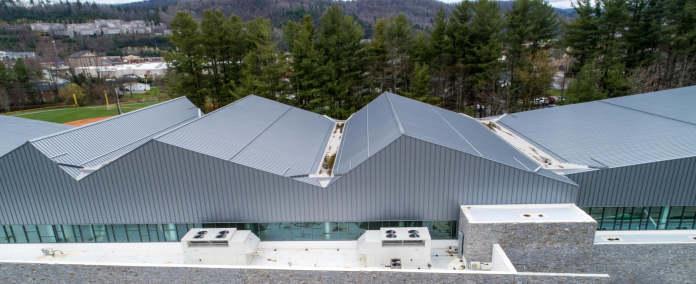As a business owner or commercial building manager, your decision to undergo roofing construction was made in the best interest of your company. Needless to say, a properly functioning roof provides basic shelter and safety for your business, employees and customers. The flip side is that your business may need to close down to accommodate the loud, dangerous construction at your site, causing a temporary loss in revenue. Even if your business doesn’t need to close down, you may still have disgruntled customers on your hands. However, commercial roofing services won’t necessarily impede the flow of your business as long as you are working with expert contractors who will serve as advisors in making proactive preparations.
Should You Close or Stay Open?
First of all, you will need to use your best judgment on whether to close down or stay open during construction. Take into consideration the degree of roofing construction your building requires and the type of roof to be installed (more on this later), as well as the individual needs of your business.
Some businesses may require shutting down due to their unique needs. For instance, restaurants and food packaging facilities are better off closed due to the risk of dust and particles falling from the roof and contaminating edible products. Office buildings and recording studios may find great difficulty overcoming the noise levels and shaking during a roofing replacement. Businesses that require maintaining strict temperatures to store products, such as grocery stores and butcher shops, or to keep humans comfortable, as in hotels or gyms, may want to consider closing given that the rooftop HVAC unit must be powered off.
If you assess that dust and debris, noise and disruptions, or lack of heating and cooling would not severely compromise your normal functioning nor put anyone in danger, then you may be able to stay open. That’s not to say these variables won’t still affect your company. On the contrary, you will need to make preparations to cope with them. Your decision to remain open merely reflects that the loss of revenue from closing for several weeks outweighs your particular business’s dearth of safety or production requirements.
Work With A Professional Roofing Contractor
As for the degree of roofing construction or type of roof needing to be installed, your roofing contractor should be able to provide expert guidance. Don’t hesitate to ask them for an educated estimate of the intensity or intrusiveness of this construction project or for a detailed explanation of what to expect when installing your chosen roofing system. To be prepared, you need practical information and advice from professionals who are willing and happy to address your business and safety concerns.
All of this comes down to having confidence and trust in your roofing contractor. When hiring a roofing company, get quotes from various roofing companies and vet each one to find the right fit for you. Ask the following questions to find genuine experts who can handle the protocols needed to keep your business open during construction:
- What kinds of interruptions should we expect for this type of roofing project? How will your team mitigate them?
- How much will your crew need to access the inside of the building?
- Which areas outside the building will need to be blocked off?
- How long will the full construction project take, and what milestones can I expect?
- How can you help my business to continue running as smoothly as possible?
- How can I help your team to work as smoothly as possible?
- What have your past clients done to prepare customers and employees for such a project?
- What safety protocols does your crew implement?
- What safety measures do you recommend my business performs?
Experienced roofers will be familiar with these kinds of questions and ready to answer them with practical solutions. Equipped with knowledge of the obstacles you will be up against during construction and a mutual plan with your roofing contractor to address them, you will be ready to handle the situation with grace.
Thorough Communication
The highest priority of any manager is to care for the business’s customers and employees. Make time to thoroughly brief your employees on all that you learned from your roofing contractor, especially regarding the kinds of disruptions to expect, how to handle them, and how long they will persist. With such information in hand, you empower your employees to proactively reason and sympathize with customers regarding any inconveniences.
Similarly, put forth significant efforts into informing your customers of any changes to your business, including adjusted business hours, altered customer service procedures, and restricted access to certain parts of your building or property. Notify your customers of the construction a long time in advance using all your marketing channels, such as emails, newsletters, word of mouth, social media posts, direct mail, and physical signs. Reassure them that your business is still open and that their safety and satisfaction is your top concern.
Outdoor Preparations
Construction is messy, and labor crews need plenty of space in which to operate the mess. Are you prepared to accommodate enough space for your roofing project? Consider the layout of your property first. You will need to designate a specific area of your land for the roofing crew and their vehicles, tools and materials. Make sure this section is out of your customers’ way and not blocking traffic nor too many parking spaces. Once you have decided where to put the crew, rope off that location and put up signs in prominent spots indicating restricted access due to safety concerns. If you know what times of day or days of the week are your busiest, it may be a good idea to station an employee outside at those times to direct vehicular and pedestrian traffic.
Public Safety
In addition to coordinating physical preparations to your property, you should require your roofing crew to use caution in handling theirs. You may request that your contractor use specific safety practices, like barring off areas where debris could fall and placing equipment out of reach of the public. Consider also any variables just outside your property. Disclose your construction project and time frames to neighbors or other businesses that share a road or parking lot with you so that they may make their own preparations well in advance. If need be, consult your local police department regarding any necessary changes to public roads’ traffic patterns.
While it can be a daunting task to cope with the realities of such a massive construction project, you don’t have to face it alone when you work with an expert roofing contractor. Their practical advice and genuine empathy are enough to prevent your business from needing to close down and lose money for weeks at a time. As long as you make adequate preparations to ensure the safety of your customers and employees, rest assured that the new roof was a decision well-made for the sake of your business’s health and longevity.





































